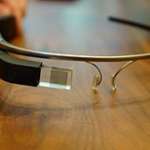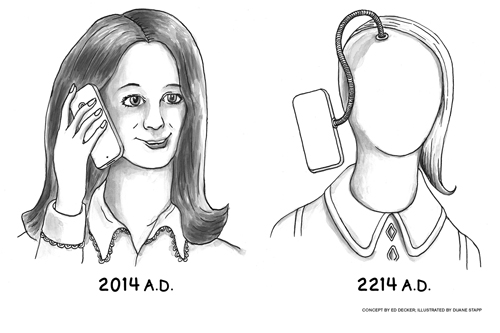Today’s dizzying pace of new technology is quickly leading people to question whether most tech headlines are science fiction or fact. The list of startling advances goes on and on. I’ve selected nine of them that will dramatically affect our daily lives:
 1. Nanobots. The wind-up toy with flashing lights I had as a kid was primitive compared to the super-miniaturized robots under development today. Nanobots are smaller than the period at the end of this sentence, measuring only a few nanometers across (a sheet of paper is about 100,000 nanometers thick).
1. Nanobots. The wind-up toy with flashing lights I had as a kid was primitive compared to the super-miniaturized robots under development today. Nanobots are smaller than the period at the end of this sentence, measuring only a few nanometers across (a sheet of paper is about 100,000 nanometers thick).
Despite their incredibly small size, nanobots can be equipped with motors, sensors, and communication devices that will allow us to send them on various missions within the human body. They are poised to revolutionize medical treatment by detecting and treating tumors the size of a single cell. By the 2030s, 90% of cancers could be treated with these microscopic marvels.
2. Bioprinting. Imagine having a printer that can make copies of three-dimensional, living cells. Bioprinter technology has the potential to create human tissue and may eventually be able to produce an entirely new heart. Researchers at Washington University in St. Louis and the University of Illinois at Urbana-Champaign have already used this technology to produce an electronic membrane that can be fitted to a heart and keep it beating indefinitely.
 3. Mental Telepathy. Neuroscientists have figured out how to decode our brain waves, move objects using sheer concentration, and translate thoughts into audible speech. The next logical step would be for people to read and send signals back and forth—in effect, to read each other’s minds.
3. Mental Telepathy. Neuroscientists have figured out how to decode our brain waves, move objects using sheer concentration, and translate thoughts into audible speech. The next logical step would be for people to read and send signals back and forth—in effect, to read each other’s minds.
Translation of electrical activity in the brain may also enable us to overcome deficiencies associated with dementia or speech impairment. My fear is that advertisers will exploit this technology to send spam electronically to our minds, with catchy subliminal headlines compelling us to buy Brand X. A whole new set of regulations may be required to protect us from ESP: Extrasensory Sales Pitches!
4. Universal Language Translators. Pope John Paul II was fluent in eight languages. The rest of us may have another option previously available only to crew members on Star Trek. The Sigmo bluetooth device will translate spoken speech into 25 different languages in real time. Press one button and the speaker’s voice will be translated into one language. Press another button and it will be translated back into the first one. This should be a giant step forward for world diplomacy.
5. DNA-based Healthcare. One size certainly doesn’t fit all when it comes to healthcare. DNA mapping combined with the ability to repair genetic defects holds the promise of treating anyone based on his or her unique gene expression. Treatment trial and error can also be reduced because doctors can learn in advance how a patient will respond to a particular drug. Eventually, it might be possible to establish immunity to most diseases at the molecular level.
One major hurdle remains: extremely high cost. Will insurance companies cover it?

“Expecting a machine close to the creative intelligence of a human within the next 50 years would be highly ambitious,” according to Dennis Wolpert, a Royal Research Society professor at the University of Cambridge. But scientists at the Singularity Institute aren’t taking any chances. This California-based think tank is developing strategies for keeping our machine creations human-friendly.
6. Household Androids. Scientists are making mechanical humans (known as androids) a lot more personable these days. Previously relegated to industrial and surgical tasks, they’re now making their move into everyday life. It may not be long before robot servants become standard household equipment, freeing us from the toil of vacuuming, scrubbing bathtubs, doing laundry…even cooking pancakes! There are male and female androids, complete with silicon rubber skin that makes them appear eerily human.
Scientists from Cornell University have developed a “robo-maid” who can open a refrigerator and pour you a beer. In Japan, androids serve as receptionists in some companies. There are even robotic soccer leagues!
7. Comic-Strip Social Networks. How would you and your friends like to become characters in a cyber comic strip? In 2010, Google filed a patent for a technology called Self-Creation of Comic Strips in Social Networks and Other Communications. This option would allow you and your gang to assume the identities of cartoon characters of your choosing, have your conversations placed in space bubbles, and see your activities showcased in cartoon strips displayed on your mobile device.
For a generation inundated with reality TV, this might be a welcome switch: turning reality into fantasy.
 8. Totally Personalized, Wearable, Go-Anywhere Mobile Computers. Leave it to Google to move this technology forward. It has already created Google Glass, a wearable computer resembling a pair of eyeglasses that you can activate with either voice or gesture. Also being explored by Google technologists: a headset that would project a virtual keyboard onto one hand that you can type on with your other hand.
8. Totally Personalized, Wearable, Go-Anywhere Mobile Computers. Leave it to Google to move this technology forward. It has already created Google Glass, a wearable computer resembling a pair of eyeglasses that you can activate with either voice or gesture. Also being explored by Google technologists: a headset that would project a virtual keyboard onto one hand that you can type on with your other hand.
It’s hard to imagine where mobile technology can take us next. It can already track our every move, tell us how many calories we’re burning, and suggest where to shop or grab a bite while we’re on the move. Future cellphones may come standard with sensors that can see and hear what’s around them, maybe even have the ability to taste and smell. We won’t need our own sense organs anymore—we can simply plug our mobiles into our minds!
9. Immortality? Is eternal life achievable through science? The jury is still out, but we’ve made major strides in that direction: Prosthetic devices can replace everything from arms and hands to eyes and ears. It’s possible to manipulate DNA to make us immune to disease. We even have the ability to download our synapses to a hard drive.
Some theorists think that we may one day sustain our existence through an independent life-support system for the human brain—an “avatar” that will replace a body that is either worn our or damaged beyond repair. The U.S. Department of Defense is taking this possibility very seriously. Its 2013 budget included $7 million for the Avatar Project, whose goal is to “develop interfaces and algorithms to enable a soldier to effectively partner with a semi-autonomic bi-pedal machine and allow it to act as the soldier’s surrogate.”
If we indeed develop the capability to sustain life indefinitely, those with certain religious beliefs will be presented with a daunting question: Will avatars make the soul obsolete?
Related articles




1 Comment
Barbara Botta
Awesome article Ed Decker. … we really have come a long way, baby.